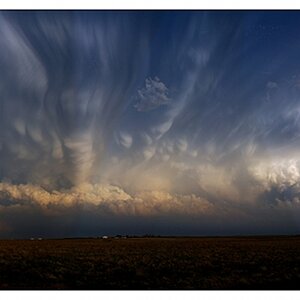PetersCreek
TPF Noob!
- Joined
- Aug 5, 2005
- Messages
- 239
- Reaction score
- 4
My first computer, the Commodore VIC-20, had a whopping 5 kilobytes of RAM...but I could only write programs to 3K. I even learned 6502/6510 assembly language to make my programs faster. I also expanded the memory to 32K by building my own expansion module, to save money. I planned it, etched the PC board, and assembled it chip by chip. I loaded my programs to/from cassette...slowly.
Later, I upgraded to the C64. The first hard drive I owned was large, external, and had a capacity of 170 kilobytes, IIRC. When the Commodore 128 came out, I remember a friend saying there'd never be a need for more than 128 kilobytes of memory.
My first real camera all my own was a little kodak 126 insta-matic. First SLR was the Canon AE-1, purchased in '81. I traded it in weeks later for an AE-1 Program, which I still have today. It's stored in a box but it still works like a champ.
Later, I upgraded to the C64. The first hard drive I owned was large, external, and had a capacity of 170 kilobytes, IIRC. When the Commodore 128 came out, I remember a friend saying there'd never be a need for more than 128 kilobytes of memory.
My first real camera all my own was a little kodak 126 insta-matic. First SLR was the Canon AE-1, purchased in '81. I traded it in weeks later for an AE-1 Program, which I still have today. It's stored in a box but it still works like a champ.




![[No title]](/data/xfmg/thumbnail/37/37108-62307f01c11ef92f5655ed4501d565ce.jpg?1619737882)
![[No title]](/data/xfmg/thumbnail/35/35952-55c8d42ec1c6ff0e13b45356cbf9c068.jpg?1619737263)

![[No title]](/data/xfmg/thumbnail/33/33436-1304fb294d2141a65ae8309383a3e52a.jpg?1619735968)


![[No title]](/data/xfmg/thumbnail/41/41786-0de67cacf7270937b4833f67d003f9c2.jpg?1619739891)


